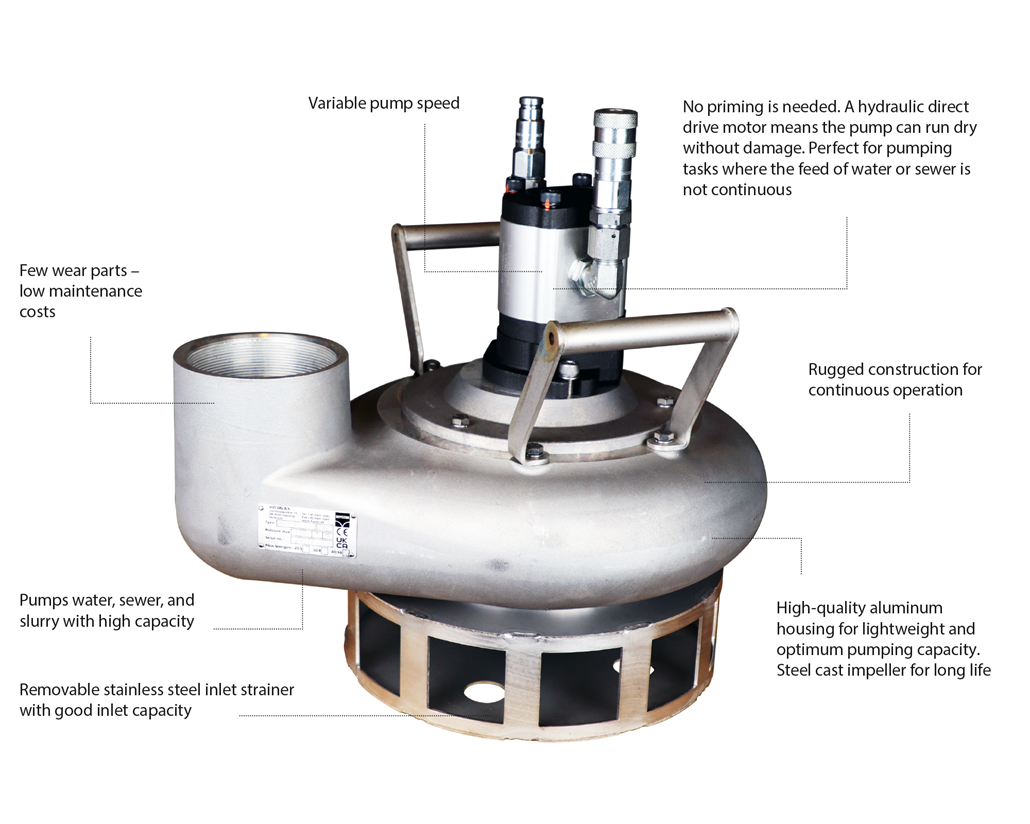HYCON Hydraulic Submersible Pumps
The HYCON hydraulic submersible pumps are small, powerful, and made for heavy-duty jobs.
For flooded excavations, tunnels, by-pass pumping of sewer lines, or the like. HYCON submersible pumps are designed for the high demand in the construction industry.
Thanks to the clever impeller design, the pumps are unaffected by particle sizes up to 74 mm, and wear is significantly reduced compared to other pumps.
HYCON pumps are compact in size, light in weight, with high capacity. Driven by the built-in hydraulic motor, they can run dry and be operated from compact power packs or directly from the excavator, tractor, or truck on site.

Additional features
▶ No electric cables.
▶ Very high performance in a compact size and weight.
▶ Few wear parts – less service.
▶ Direct drive hydraulic motor for long pump life.
▶ Powered directly from compact power packs, tractors, excavators, etc.
▶ Max. head 30 m (2") - 20 m (3") - 22 m (4").
▶ Accept solids up to Ø38 - 74 mm depending on pump size.
HYCON Oil Flow Divider - HFD
The HYCON HFD Oil Flow Divider replace the need for power packs and is perfect to drive all HYCON tools on worksites where there already is an hydraulic machine like a backhoe, skidsteer or mini excavator in place.
Simply connect the preset HFD to the Hydraulic Power Take Out (PTO) and you are assured correct flow, pressure and rotation on saws, pumps and other tools needed on the jobsite.
The HYCON oil flow divider has 3 built-in functions:
- Output oil flow control by the build in flow regulation valve.
- Maximum tool working pressure ensured by a pressure relief valve.
- Ensures the correct oil flow direction by a check valve.
Download product sheet in the DOWNLOAD section below.
Choosing the Right Submersible Pump for Your Needs
Understanding submersible pump types
1. Water pumps:
Water pumps are designed to handle relatively clean water and are commonly used for draining flooded areas or managing stormwater. They are essential in construction for dewatering flooded excavations, managing groundwater, and maintaining dry work environments. Their high flow rates make them suitable for rapid water removal.
2. Sewage pumps:
Sewage pumps are built to handle liquids containing solids or debris. They are often used in municipal sewage systems, wastewater treatment plants, and industrial settings. Their robust construction enables them to manage raw sewage, sludge, and other abrasive materials without clogging.
3. Slurry pumps:
Slurry pumps are specialized pumps designed for handling dense slurries with high concentrations of solid particles. They are commonly used in mining, dredging, and heavy industrial applications where abrasive and corrosive materials are present. Their durable materials and advanced impeller designs help them withstand tough operating conditions.
Key features to consider
1. Flow rate and pressure requirements:
Flow rate, usually measured in gallons per minute (GPM) or liters per second (L/s), determines how quickly the pump can move liquid. Consider your specific application to determine the necessary flow rate. Pressure requirements, often linked to head (the height a pump can raise water), are equally important. Ensure your chosen pump can meet the head requirements to avoid underperformance or system inefficiencies.
2. Abrasion and corrosion resistance:
If you are dealing with abrasive or corrosive liquids, select a pump made from durable materials like stainless steel, cast iron, or special alloys. Coatings and linings can also provide additional protection. Abrasion-resistant impellers and casings will prolong the pump’s life in environments with high solids concentrations.
3. Portability and ease of setup:
Construction and public sector applications often require portable pumps that can be easily deployed and repositioned. Look for pumps with ergonomic designs, manageable weight, and quick-connect fittings to facilitate rapid installation and relocation.
4. Motor efficiency and cooling:
Choose a pump with a motor designed to minimize energy consumption while delivering high performance. Motor cooling systems are critical in preventing overheating, especially in continuous-use scenarios.
5. Maintenance requirements:
Low-maintenance pumps will save time and costs in the long run. Opt for pumps with features like oil-filled motors, double mechanical seals, and replaceable wear plates that simplify maintenance.
Applications across industries
1. Construction:
In construction, submersible pumps are used for dewatering flooded excavations, draining basements, and bypass pumping in sewer and water line projects. They help keep work environments safe and dry, enabling projects to proceed without delays caused by standing water.
2. Public sector:
In the public sector, submersible pumps are essential for managing sewage, wastewater, and stormwater systems. They provide continuous sewage bypass pumping during maintenance and relining work, preventing service disruptions and environmental hazards.
3. Underwater works:
Underwater works such as dredging require robust and reliable submersible pumps to handle challenging environments. Our submersible pumps are designed to operate effectively underwater, providing high performance for tasks like sediment removal and the maintenance of underwater structures. These pumps are capable of handling various types of fluid waste, ensuring efficient and uninterrupted operations.
4. Municipal and commercial property:
Submersible pumps are also used for flood control in municipal and commercial properties. Sump pumps, in particular, are vital for protecting basements, parking garages, and underground facilities from flooding.
Download
